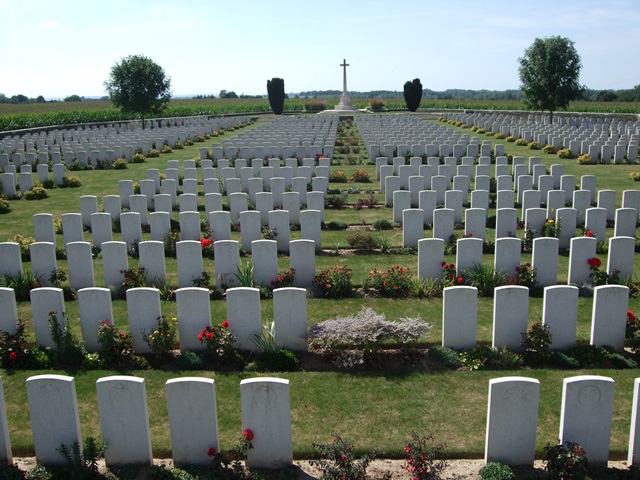William Crossland
Date of birth: 1891
Date of death: 23.8.1918
Area: Outwood
Regiment: King’s Royal Rifle Corps
Family information: Husband of Alive Crossland nee Briggs
Rank: Rifleman
Service number: C/7149
War Service
After a medical at Wakefield, on 25th September, Rifleman William Crossland was posted to the 18th Battalion, Kings Royal Rifle Corps.
The 18th K.R.R.C. went to France on 3rd May 1916, part of 122nd Brigade, 41st Division. After some weeks training, the 41st Division moved to the Somme battlefield, but was not involved in any attacks until the 15th September. At this time, the 18th K.R.R.C. was part of an assault towards the village of Flers, incurring over 350 casualties during four days fighting. On the 10th October, shortly after a further attack against Flers, Rifleman Crossland suffered a gunshot wound to the leg and three days later, was repatriated to the United Kingdom. After three months at home, Rifleman Crossland was considered fit for duty and on 13th January 1917, he returned to France. On 15th February he was posted to the 16th Battalion, Kings Royal Rifle Corps.
The 16th K.R.R.C. had been in France since November 1915, part of 100th Brigade, 33rd Division. The Brigade was deployed in the Arras sector, when Rifleman Crossland joined the 16th Battalion. Shortly afterwards, the German Army began a withdrawal to defensive positions on the Hindenburg Line. On 24th April 1917, the 33rd Division was involved in attacks against these defensive positions near Croisilles, when the 16th K.R.R.C. incurred 270 casualties. The Battalion was involved in further attacks against the Hindenburg Line, before the 33rd Division moved to the Ypres Salient, in September. Here the 16th K.R.R.C. was involved in attacks against the Menin Road Ridge, during the Third Battle of Ypres.
In December 1917, Rifleman Crossland was hospitalized with synonitis to the knee, but returned to his unit just before Christmas. On 26th January 1918, he was given fourteen days leave and returned to England. On 9th February, on completion of his leave, William Crossland rejoined his unit on the Ypres Salient.
At dusk on 11th April, the Division took over the line from Le Romarin to east of Neuve Eglise, with the 16th K.R.R.C. on the brigades left. By 16.00hrs on 12th April, the enemy attacks had forced the troops on the right to fall back, allowing the enemy to enter Neuve Eglise. On the following morning, the 16th K.R.R.C. line was taken in reverse, but the battalion continued to fight for a further three days. However, during this fighting, the battalion incurred 567 casualties, of which 337 were reported as missing.
Rifleman William Crossland, was one of many taken prisoner of war. During his captivity William Crossland was injured during an air-raid and admitted to the Marle Hospital, in Germany. On the 23rd August 1918, he died from his wounds and was buried in the German Extension of the Marle Communal Cemetery. Unfortunately his grave was lost, but he is commemorated by a special memorial headstone in the British Cemetery at Grand-Seraucourt, near St Quentin. There are now over 2000 burials in the cemetery, of which almost two thirds are unidentified. William Crossland is also remembered on the memorial at Marle German Cemetery and on the Wrenthorpe Colliery Memorial at St John’s Church, Wakefield.
His wife, Alice, who gave birth to their daughter Marjorie, on the 13th October 1918, was living with her parents at Ledger Lane, Outwood, when she was informed of her husband’s death.
Family Life
William Crossland was born in 1891, the third son of Joe and Hannah Crossland of Shires Row, Stanley Lane End. His father, Joe Crossland was employed as a hewer at the local colliery. In 1908, when William was working at the local colliery, his mother Hannah Crossland, died at the age of 52 years. William and his father continued to live at Shires Row, with his widowed sister, Margaret Roberts, returning to be housekeeper at the family home. On the 29th May 1915, William Crossland married Alice Briggs at St Mary Magdalene Church, Outwood. Alice Briggs, aged 21 years, was the daughter of George and Susannah Briggs of Hepworth’s Buildings, Ledger Lane, Outwood.
Shortly afterwards, on the 17th September 1915, William Crossland, who was then working at Wrenthorpe Colliery, enlisted in the army for the duration of the war.
 Grand-Seraucourt British Cemetery
Grand-Seraucourt British Cemetery

